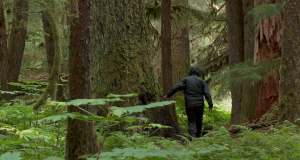Musicwood (Maxine Trump, 2012): USA
Reviewed by Mikael Myggen. Viewed at the Metro Theater, Santa Barbara Film Festival
I would just like to say upfront and say that I don’t consider myself to be a fan of documentary films in general. I understand the purpose that the genre has, but the problem that these films face so often is that they are too boring, uninteresting, and irrelevant for viewers to care. Luckily, that is not the case here

Musicwood is a wonderful film that knows exactly which notes it needs to hit. As soon as the movie starts, viewers are greeted with a cavalcade of eye candy in the form of lush green forests and some nice typographic effects. It’s a pro-environment film, but it doesn’t often feel preachy. There is definitely some bias that shows in the way it was edited together, examples including parts where dark, broody music accompany the fall of chopped down trees, and positive messages associated with full forests, but I don’t think the bias is a bad thing at all, as I’d be hard-pressed to find people who are anti-environment.
The premise of the film is sort of complicated, but it explains itself in a pretty understandable way. You’ll have one scene of a person saying something about how somebody else is handling their business and then it cuts to that person with some sort of reaction. People are introduced via title cards on the bottom of the screen, and occasionally when they’re brought back later in the film, the names reappear for people who may have forgotten who so-and-so was. Stylish visual graphics occasionally come in to give more of an idea of what certain things mean. And on top of all that, the plot is easy to understand and easy to relate to. The film as a whole feels accessible, and avoids the cliché that documentaries are only for activist weirdoes and old people.
The short version of the story is that there’s a forest in Alaska called the Tombas National Forest, and it’s an important place because some of the best trees for making quality acoustic guitars come from that forest. Guitar companies don’t actually need that many of the trees, only around 150 of them per year. As the audience follows these guitar company CEOs, they discover with us what’s happening to the forests there. The main controversy of the film comes from an organization called Sealaska, who regularly clearcuts huge parts of the forest for Chinese manufacturing. The guitar CEOs quickly figure out that they want to stop the clearcutting for nature’s sake, and Sealaska wants to keep making a profit no matter the cost.

The video and audio for this movie is great. There’s a healthy mix of practical face-to-the-camera shots for interviews, and more artsy shots put in place to get the attention of the viewer. The soundtrack to the film consists mostly of guitars and occasionally pianos, and I think it’s smart to let viewers know how much value the instrument has just by letting them listen to it.
The dialogue in the movie is pretty interesting as well, which is really important for a documentary. At one point in the movie, Bob Taylor, CEO of Taylor guitars says something like “Sealaska says that what they’re doing is harvesting the trees, but I think it’s more like they’re mining them. A harvest… implies that you did something to get there, but Sealaska didn’t do anything for those trees” Both sides of the film, the human side and the corporation side, make equally good points about the choices they make regarding the wildlife, and the fact that there isn’t a conclusive answer to these problems leaves the viewer thinking, which is one of the best things a documentary can do.
Unfortunately the film starts to drag on a little bit towards the end as it runs out of things to talk about, but for the most part, it’s entertaining and interesting. For anyone even remotely interested in guitars and the environment, the film is a worthwhile experience.
About this entry
You’re currently reading “Musicwood (Maxine Trump, 2012): USA,” an entry on Student Film Reviews
- Published:
- 01.28.13 / 10am
- Category:
- Films, Santa Barbara Film Festival 2013
6 Comments
Jump to comment form | comments rss [?] | trackback uri [?]